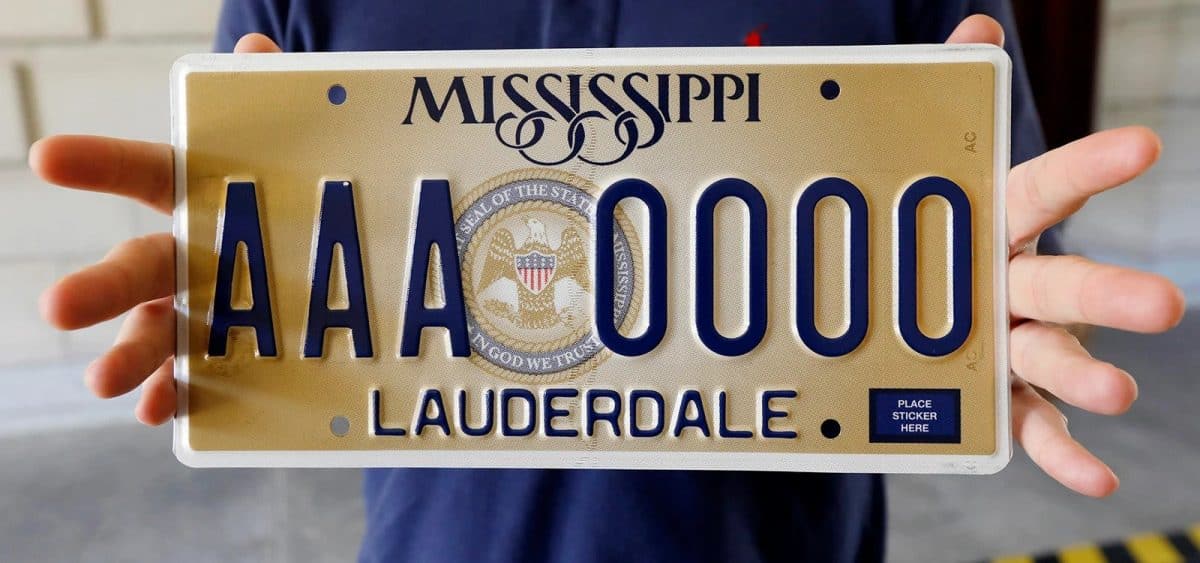
(RNS) — Atheist and humanist groups are suing Mississippi over the state’s “In God We Trust” license plate, calling it unconstitutional and seeking alternatives that don’t require additional fees for Mississippi drivers. In a federal complaint filed Tuesday (June 22) in Mississippi U.S. district court, American Atheists, the Mississippi Humanist Association, and three nonreligious Mississippi residents claim the state’s license plate violates nonreligious people’s freedom of speech by forcing them to display the religious message on their vehicles.
“The phrase ‘IN GOD WE TRUST’ is rooted in hostility toward non-Christians and atheists, intended to convey the message that non-belief in the Christian god is un-American,” according to the lawsuit.

Mississippi’s standard license plate is shown at the Capitol in Jackson, Mississippi. (Rogelio V. Solis/Associated Press)
Mississippi’s standard license plate has been sold since January 2019, according to the Associated Press. The center of the plate shows the state seal, which includes “In God We Trust.” Mississippi offers several specialty license plate designs for about $30 extra per year.
The suit says Mississippi car owners have to choose between displaying the state’s standard license tag on their vehicles or paying an additional fee to display a special tag of their choice. And there are others who don’t have another option besides the standard plate, the suit said, such as those who operate recreational vehicles, motorcycles, or trailers, which must display a license tag derived from the standard tag design and with the “In God We Trust” message.
Even car owners who seek to display their own custom alphanumeric combination are forced to do so on the standard tag design with the “In God We Trust” message because paid specialty tags cannot be personalized, according to the lawsuit. Only the standard license plate can be personalized, the suit claims. The suit notes that Mississippi law provides special tags at no additional fee to active and retired members of the U.S. armed forces, government officials, Purple Heart recipients, sheriff’s deputies, those who are hearing-impaired, and others.
The complaint seeks injunctive relief against Chris Graham, commissioner of the Mississippi Department of Revenue, forbidding him from charging additional fees to Mississippi car owners “who do not wish to endorse the state’s ideological message, ‘IN GOD WE TRUST,’ by displaying it on their vehicles.”
The suit calls for an injunction prohibiting Graham from requiring any Mississippi resident — who owns a trailer, RV, or motorcycle and who objects to displaying “In God We Trust” on it — to obtain a license tag derived from the standard tag with the religious message. The lawsuit also wants those who seek to customize their plates to be able to do so without having to use the “In God We Trust” standard tag.
American Atheists, in a statement, lambasted Gov. Tate Reeves for championing the Senate’s efforts to put “In God We Trust” on the state seal back when he was a lieutenant governor in 2014. In a subsequent campaign for governor, Reeves appeared adjusting such a license plate during a 2019 commercial in which he equated “In God We Trust” with Mississippi values.
“No matter how much Gov. Reeves or other politicians want to pretend that Mississippi is some kind of Christians-only club, it doesn’t make it true,” said American Atheists President Nick Fish in the statement. “Forcing atheist drivers to endorse a religious message they reject is antithetical to our values as Americans and unconstitutional, plain and simple.”
In the suit, the groups stress they are not challenging the national motto or the Mississippi state seal. Instead, they are challenging the rules and practices requiring “Mississippi’s nonreligious drivers to display the government’s preferred ideological, religious message on their vehicles or, if they refuse to do so, pay higher fees to legally drive their vehicles,” according to the suit. These practices, the lawsuit claims, violate their free speech and free exercise rights under the First Amendment.
The lawsuit argues that by only giving nonreligious people the choice of displaying the state’s standard “In God We Trust” license tag or instead paying an additional fee, Graham is requiring them “to engage in activity that violates their sincerely held beliefs and coerced them to engage in religious exercise to which they object.”
The complaint references the Fulton v. Philadelphia case, in which the Supreme Court ruled last week that a city-funded foster and adoption agency that opposes same-sex marriage on religious grounds can be exempted from serving such couples.
In a statement, American Atheists said the Fulton case bolsters the group’s claims.
“The Court ruled that where a law or policy includes a system of exemptions, a similar exemption must be provided for anyone with religious objections. Since Mississippi provides alternative plate designs to certain categories of individuals, atheists, and other Mississippians who object to ‘In God We Trust’ must receive equal treatment,” the statement says.






